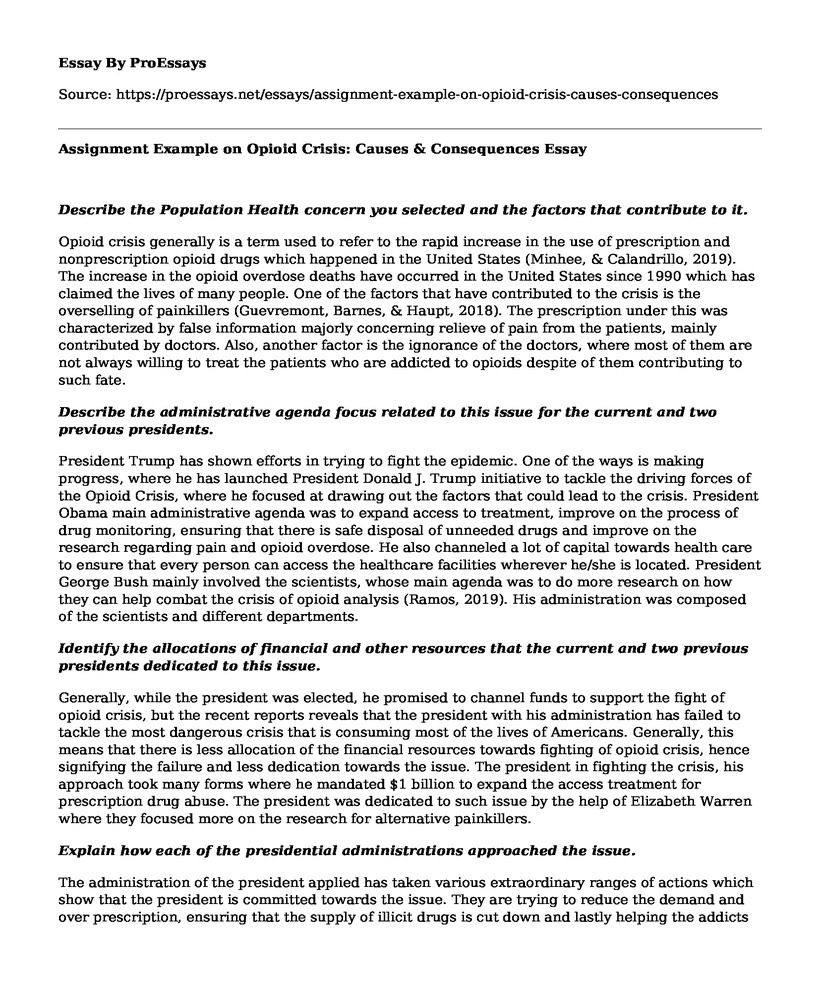Describe the Population Health concern you selected and the factors that contribute to it.
Opioid crisis generally is a term used to refer to the rapid increase in the use of prescription and nonprescription opioid drugs which happened in the United States (Minhee, & Calandrillo, 2019). The increase in the opioid overdose deaths have occurred in the United States since 1990 which has claimed the lives of many people. One of the factors that have contributed to the crisis is the overselling of painkillers (Guevremont, Barnes, & Haupt, 2018). The prescription under this was characterized by false information majorly concerning relieve of pain from the patients, mainly contributed by doctors. Also, another factor is the ignorance of the doctors, where most of them are not always willing to treat the patients who are addicted to opioids despite of them contributing to such fate.
Describe the administrative agenda focus related to this issue for the current and two previous presidents.
President Trump has shown efforts in trying to fight the epidemic. One of the ways is making progress, where he has launched President Donald J. Trump initiative to tackle the driving forces of the Opioid Crisis, where he focused at drawing out the factors that could lead to the crisis. President Obama main administrative agenda was to expand access to treatment, improve on the process of drug monitoring, ensuring that there is safe disposal of unneeded drugs and improve on the research regarding pain and opioid overdose. He also channeled a lot of capital towards health care to ensure that every person can access the healthcare facilities wherever he/she is located. President George Bush mainly involved the scientists, whose main agenda was to do more research on how they can help combat the crisis of opioid analysis (Ramos, 2019). His administration was composed of the scientists and different departments.
Identify the allocations of financial and other resources that the current and two previous presidents dedicated to this issue.
Generally, while the president was elected, he promised to channel funds to support the fight of opioid crisis, but the recent reports reveals that the president with his administration has failed to tackle the most dangerous crisis that is consuming most of the lives of Americans. Generally, this means that there is less allocation of the financial resources towards fighting of opioid crisis, hence signifying the failure and less dedication towards the issue. The president in fighting the crisis, his approach took many forms where he mandated $1 billion to expand the access treatment for prescription drug abuse. The president was dedicated to such issue by the help of Elizabeth Warren where they focused more on the research for alternative painkillers.
Explain how each of the presidential administrations approached the issue.
The administration of the president applied has taken various extraordinary ranges of actions which show that the president is committed towards the issue. They are trying to reduce the demand and over prescription, ensuring that the supply of illicit drugs is cut down and lastly helping the addicts to recover by giving them support. The administration of the president focused more on the use of anti-addiction drugs to help solve the issue, where they introduced medication assisted treatment The president's administration was mainly composed of the scientists and was led by Elizabeth Warren, who approached the issue mainly through research and incorporating various bodies such as National Drug Abuse Authority to find on more effective ways to reduce crisis.
References
Guevremont, N., Barnes, M., & Haupt, C. E. (2018). Physician Autonomy and the Opioid Crisis. Journal of Law, Medicine & Ethics, 46(2), 203-219. https://doi.org/10.1177/1073110518782922
Minhee, C., & Calandrillo, S. (2019). The Cure for America's Opioid Crisis? End the War on Drugs. Harvard Journal of Law & Public Policy, 42(2), 547-623. Retrieved from http://search.ebscohost.com/login.aspx?direct=true&db=bth&AN=136471227&site=ehost-live
Ramos Hegwer, L. (2019). The Opioid Crisis: A Shared Responsibility. Healthcare Executive, 34(2), 26-31. Retrieved from http://search.ebscohost.com/login.aspx?direct=true&db=bth&AN=135467065&site=ehost-live
Cite this page
Assignment Example on Opioid Crisis: Causes & Consequences. (2023, Feb 12). Retrieved from https://proessays.net/essays/assignment-example-on-opioid-crisis-causes-consequences
If you are the original author of this essay and no longer wish to have it published on the ProEssays website, please click below to request its removal:
- Fetal Alcohol Abuse Syndrome
- The Outcomes of Weight Loss-based Diet on HbA1C in Patients with Diabetes Mellitus
- Paper Example on Dust Storms: A Risk to Our Lungs' Health
- 4 Steps to Launch a Soap Product for Pandemic Cleanliness - Essay Sample
- Paper Example on Infants Drug Withdrawal: Nurses, Acuity & Parental Needs
- Free Essay Sample on Elderly Nutrition: Challenges Posed by Loss of Teeth
- Paper Example on Analysis of Prehospital Rapid Sequence Intubation in Emergency Service South Africa







